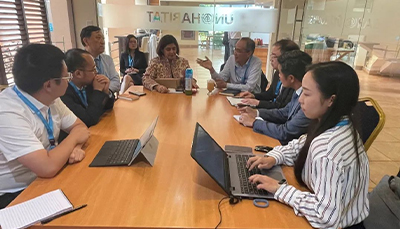


Introduction
On June 5th, 2023, the Second United Nations Habitat Conference opened in Nairobi, the capital of Kenya. The conference focused on key issues including affordable housing, urban climate action, urban crisis response, localization of sustainable development goals, multi-level governance, finance, and prosperity. Leaders, experts, and scholars from China actively participated in the conference, showcasing their achievements and exchange their experiences with other participants, sharing Chinese proposals to the sustainable development of human settlements.
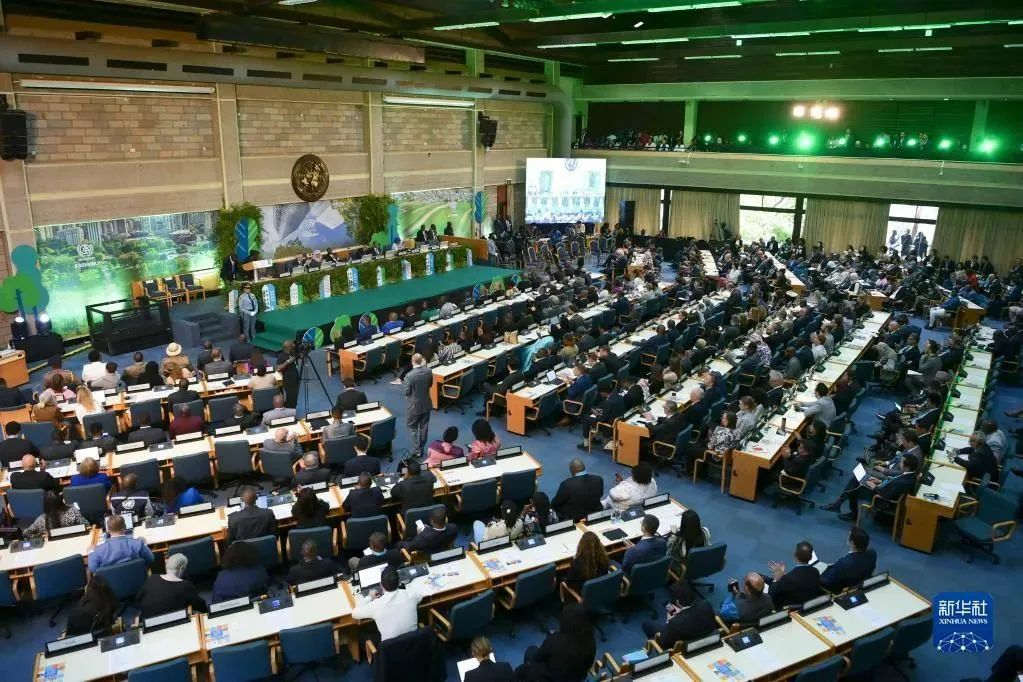
The opening ceremony of the Second United Nations Habitat Conference. Photo taken by Han Xu, a reporter from Xinhua News Agency.
The Second United Nations Habitat Conference opened on June 5th in Nairobi, the capital of Kenya. Ni Hong, the head of the Chinese government delegation and the Minister of Housing and Urban-Rural Development, stated during a joint interview with Chinese media in Kenya prior to the conference that the delegation would share China's experiences and practices in human settlement and urban sustainable development at the conference, aiming to support the implementation of sustainable development goals in cities worldwide.
Ni Hong stated that the Chinese government attaches great importance to the implementation of the United Nations' 2030 Agenda for Sustainable Development and the New Urban Agenda. China embraces the idea of people-centered development and the new development concept, striving to achieve urban sustainable development in the long term. He stated that, firstly, efforts are made to improve the lives of people. With the goal of providing adequate housing for all, China accelerates the establishment of a housing system by promoting multiple supply entities and supports, with a combination of rental and purchase options. Secondly, protecting urban ecological environment is given greater prominence. China strives to turn cities into beautiful homes where coexistence between people and nature is achieved. Thirdly, efforts are made to enhance urban governance capacity. Focusing on urban management and services, China establishes a full-cycle management and accelerates the modernization of the urban governance system and governance capacity.
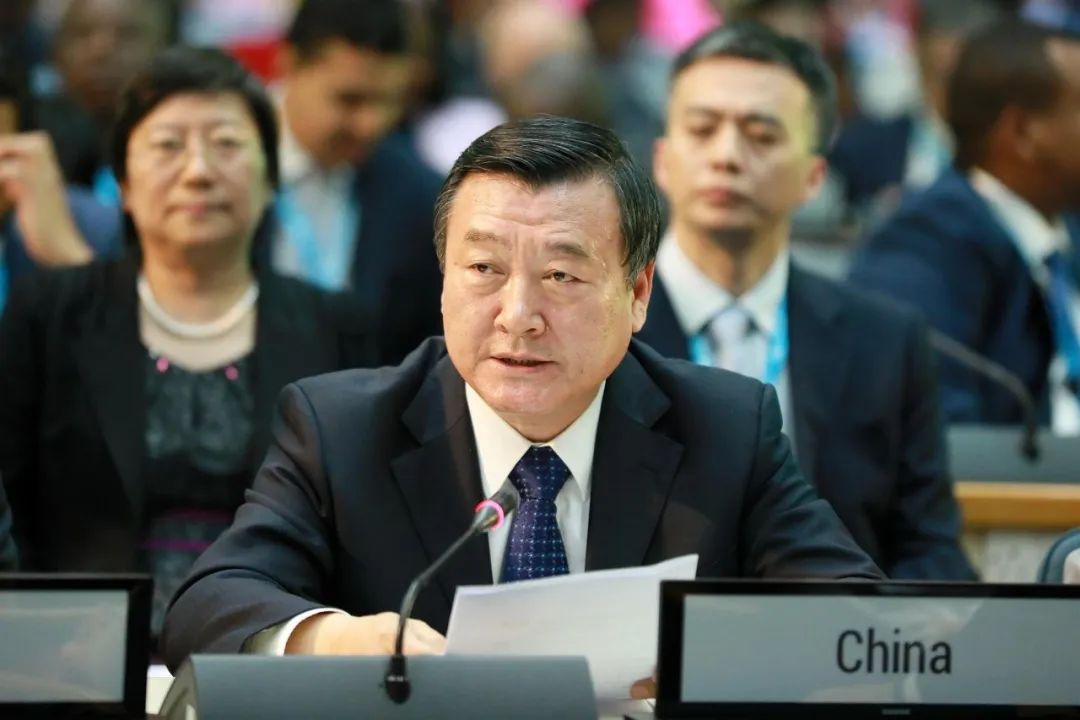
On the afternoon of June 5th, Ni Hong, the head of the Chinese government delegation and the Minister of Housing and Urban-Rural Development, delivered a speech at the plenary session of the Second United Nations Habitat Conference. ©United Nations.
Ni Hong put forward that in recent years, the Chinese government has upheld the important concept of "People-oriented Urban Development, Cities Built for the People" proposed by President Xi Jinping. China has been promoting urban construction and development, enhancing the comprehensive carrying capacity of cities, improving residents' housing conditions significantly, and reaching a new level of quality in the human settlement environment. We will always adhere to the idea of people-centered development, improve the level of urban planning, construction, and governance, implement urban renewal actions, enhance the quality of urban housing and municipal infrastructure construction, and promote cities to achieve higher quality, greater efficiency, more fairness, sustainability, and safety in development. We are willing to share experiences, seek common development, and create a better future together with everyone.
Ni Hong stated that the United Nations Human Settlements Programme (UN-Habitat) has made significant and effective efforts in promoting the development of human settlements. China will continue to support the work of UN-Habitat and work together with them to advance the implementation of global development initiatives. China will fully leverage platforms such as World Cities Day and the Global Sustainable Cities Award in October to strive towards achieving a sustainable urban future. (The full text of the speech can be found on the UN-Habitat website.)
On the afternoon of June 7th, a side event with the theme "Creating a Platform for Diverse Cooperation and Knowledge Sharing to Promote Urban Implementation of Sustainable Development Goals" was jointly organized by the Ministry of Housing and Urban-Rural Development of China, the Shanghai Municipal Government, and UN-Habitat. The side event aims to increase cooperation and exchange between flagship projects in cities of SDGs (Sustainable Development Goals), and the Global Sustainable Cities Award.
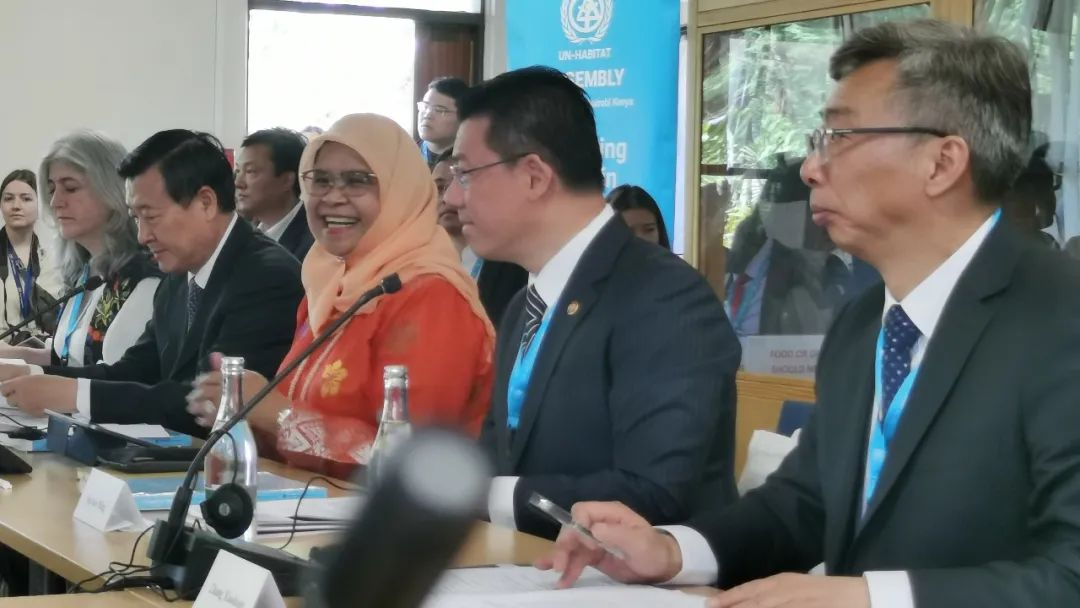
The side event themed by "Creating a Platform for Diverse Cooperation and Knowledge Sharing to Promote Urban Implementation of Sustainable Development Goals."
Ms. Maimunah Mohd Sharif, Executive Director of UN-Habitat, Mr. Ni Hong, Minister of Housing and Urban-Rural Development of China, Mr. Noh Omar, Minister of Local Government and Housing of Malaysia, Ms. Catalina Velasco, Minister of Housing, Cities and Regions of Colombia, Mr. Guilherme Simoes, Undersecretary of Brazil, and Mr. Zhang Xiaohong, Deputy Mayor of Shanghai, attended the side event and delivered speeches.
Following that, Mr. Cheng Jian, Director of the Shanghai World Cities Day Affairs Coordination Center, Mr. David Aubrey, Head of the Flagship Projects in Cities of SDGs at UN-Habitat, and Ms. Hajia Alima Mahama, Mayor of Kibi Municipality in Ghana, shared their insights.
1.Wang Kai, President of China Academy of Urban Planning & Design, participated in the Stakeholders Forum and delivered a speech.
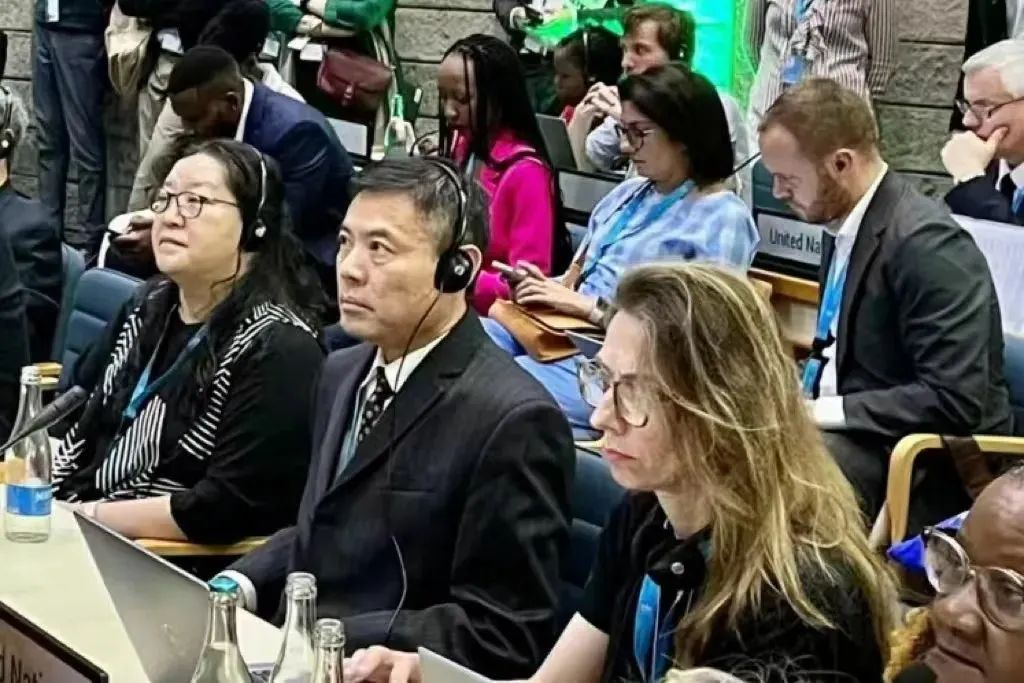
Attending the opening ceremony of the Second United Nations Habitat Conference
On the afternoon of June 4th, Wang Kai, Vice-president of UPSC and President of China Academy of Urban Planning & Design, delivered a speech titled "China's Solutions for Sustainable Urbanization" as a special guest at the "Stakeholders Forum" of the Second United Nations Habitat Conference. He elaborated on China's active contributions to advancing Sustainable Development Goal 11 of the United Nations, focusing on green urbanization institutional construction, technological innovation, practical exploration, and global cooperation. Participants at the forum responded positively to President Wang's presentation, recognizing the significance of China's exploration and practices in green urbanization, and suggesting further research on incorporating green cities and green buildings into SDG 11 based on comprehensive assessments. President Wang expressed that in the face of global challenges such as climate change and ecological degradation, China, as an integral part of the world's urbanization process, will strive to contribute China's solutions and wisdom for sustainable urbanization and share them with the world.
2.The Urban Expo, showcased urban innovation practices by Tongji University.
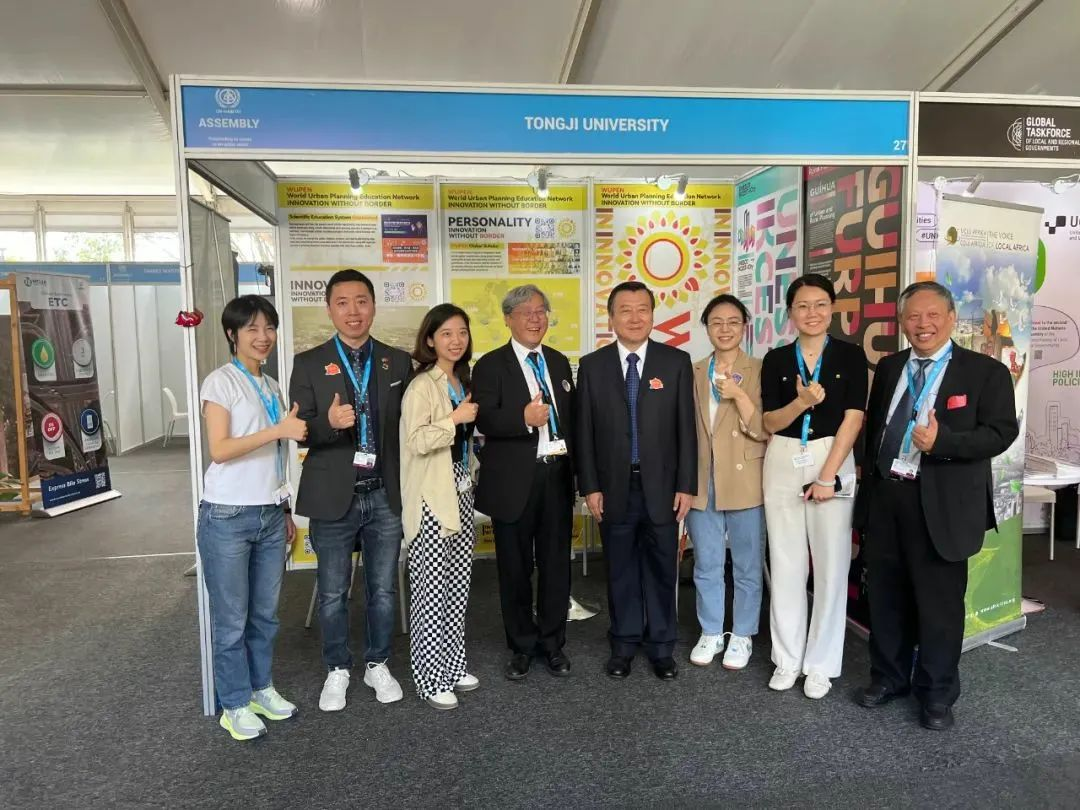
Minister Ni Hong visited the exhibition booths and took a group photo with the exhibition team from Tongji University
On the afternoon of June 5th, the Urban Expo, a city exposition, officially opened. As the only participating university globally, Tongji University showcased a wide range of urban innovation practices led by Academician Wu Zhiqiang, Chief Supervisor of UPSC. Through innovation in the field of urban planning and design education, they utilized a website and the World Urban Database to create an intelligent platform for world urban innovation planning and design education practices. The platform follows a framework of "knowledge," "skills," and "character," nurturing the urban innovation of youth.
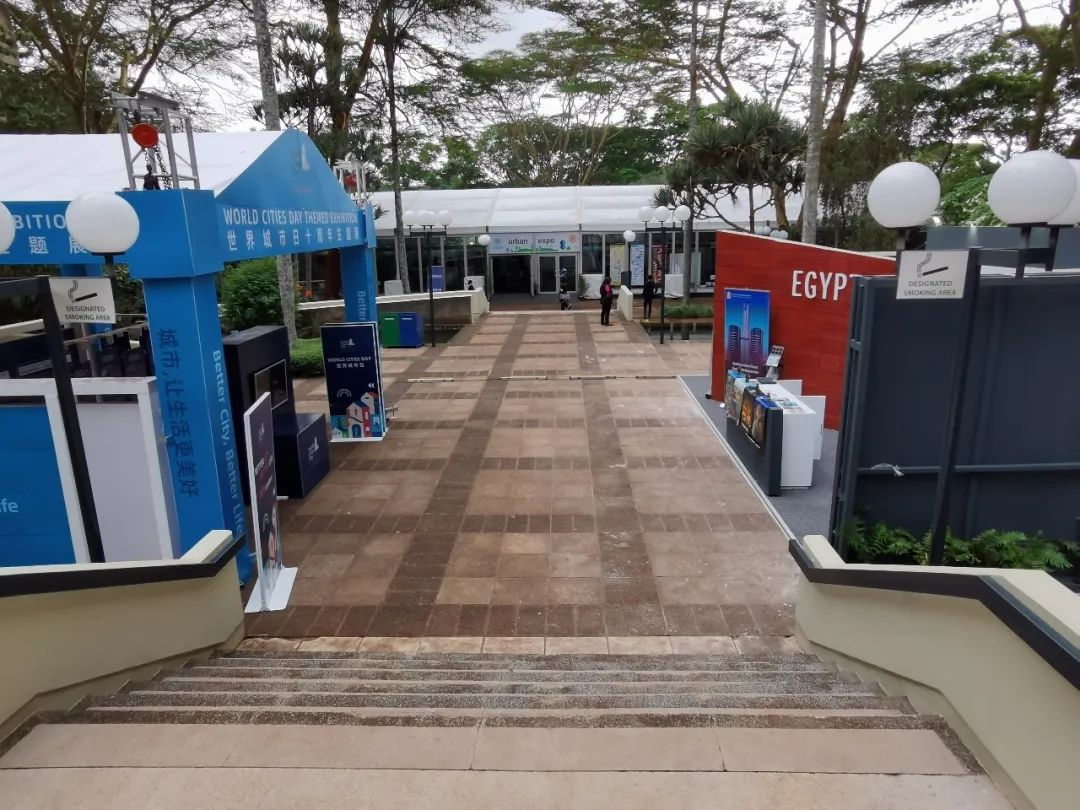
The Shanghai World Cities Day 10th Anniversary Theme Exhibition and the exhibition from Egypt, the host country of the 2024 World Urban Forum, occupied the most prominent positions.
3.Park City Index Research and Urban Assessment.

On-site of the Park City Index Research and Urban Assessment Workshop
On the afternoon of the 5th, local time, UN-Habitat and the Park City Index Research Center jointly held a workshop on "Park City Index Research and Urban Assessment" and discussed the intention to sign a memorandum of cooperation. Shi Nan, Executive Vice-president and Secretary General of UPSC, and Director of the Park City Index Center, introduced the research background and value orientation of the Park City Index. Shipra Narang Suri, Director of the Urban Practices Branch at UN-Habitat's Global Solutions Division, expressed that the park city construction in Chengdu and the research on the Park City Index are typical cases of localizing the Sustainable Development Goals (SDGs) by the United Nations. UN-Habitat will leverage its rich experience and planning capabilities to assist park cities in expanding public spaces, improving people's quality of life, and connecting the Park City Index with other cities worldwide to promote its international application and expansion.
In the next step, both parties will uphold the initial intention of providing systematic solutions for global urban transformation and development. They will collaborate to build a city sustainability assessment tool that possesses contemporary value and broad impact, to better implement the United Nations' 2030 Sustainable Development Goals.
4.The research team from Tongji University and the United Nations Human Settlements Programme (UN-Habitat) jointly released their research findings.
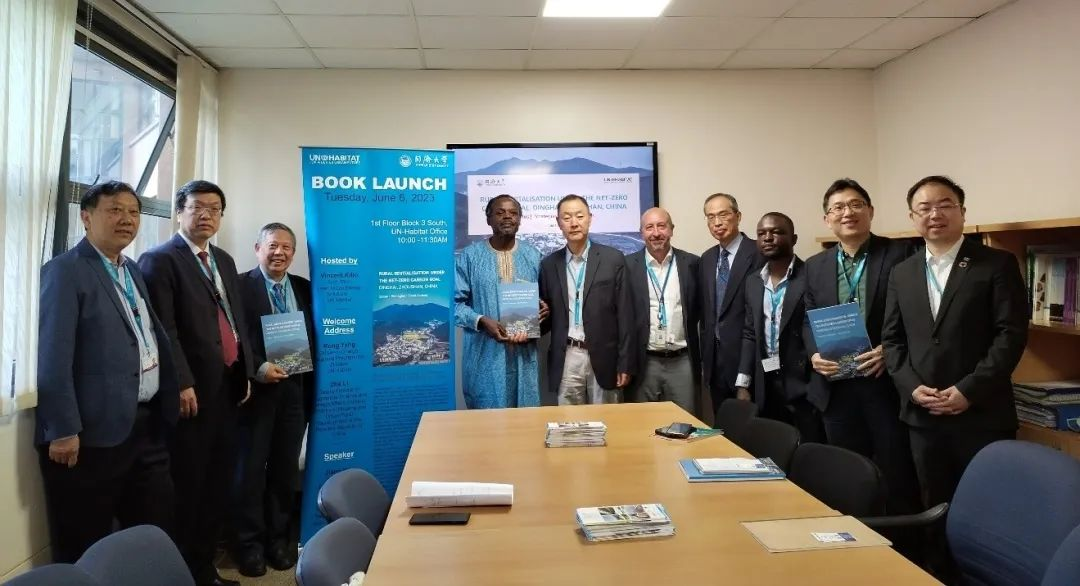
On-site of the press conference
On June 6th, the research team of Wu Jiang and Wang Xin from Tongji University, in collaboration with the United Nations Human Settlements Programme (UN-Habitat), jointly released the English research report titled "Rural Revitalization Practice in Dinghai District, Zhoushan City under the Net Zero Carbon Target." The UN representatives and experts in attendance highly appreciated the international cooperation and research achievements, particularly acknowledging the research team's ability to provide a Chinese solution by combining practical experiences in sample villages based on the theoretical framework and guidelines they established for net-zero carbon rural development four years ago. This work is significantly demonstrative and pioneering.
Building upon their English research report titled "Guidelines for Net Zero Carbon Rural Planning: A Case Study of the Yangtze River Delta Region in China" released at the first United Nations Human Settlements Conference in 2019, this research team has actively responded to the carbon peak and carbon neutrality strategies and rural revitalization strategies proposed by the Chinese government at the United Nations General Assembly in late 2020. They summarized their four years of practical experience, and once again presented the relevant outcomes of rural revitalization planning under the net zero carbon target at the United Nations Human Settlements Conference.
The two research reports released consecutively at the United Nations Human Settlements Conference have received tremendous response. The work of the Tongji University team in simultaneously achieving rural revitalization and zero-carbon development in rural construction in China, officially showcased on the United Nations platform, has allowed the Chinese path and experience in the fields of rural revitalization and zero-carbon construction to be widely disseminated worldwide.
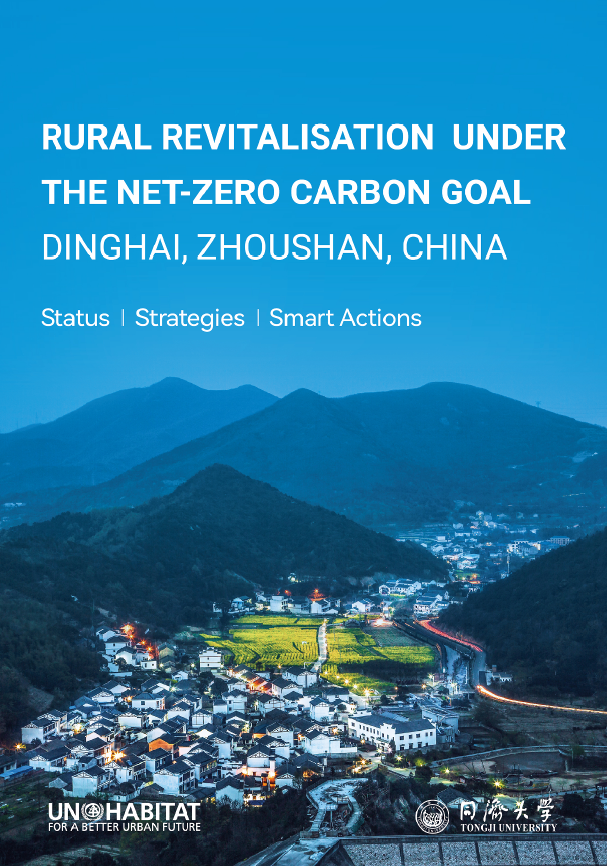
The cover of the report “Rural Revitalization Practice in Dinghai District, Zhoushan City under the Net Zero Carbon Target”
This conference will conclude on the 9th. The United Nations Human Settlements Conference is held every four years, with the inaugural conference taking place on May 27, 2019, in Nairobi.
Source: <https://mp.weixin.qq.com/s/ebR7aOPoKzZ67QJUIAMcYA>
Translated by He Huiling